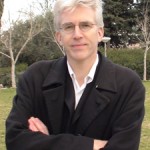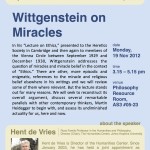In his “Lecture on Ethics,” presented to the Heretics Society in Cambridge and then again to members of the Vienna Circle between September 1929 and December 1930, Wittgenstein addresses the question of miracles and miracle belief in the context of “Ethics.” There are other, more episodic and enigmatic, references to the miracle and religious belief elsewhere in his writings and we will review some of them where relevant. But the lecture stands out for many reasons. We will seek to reconstruct its overall argument, discuss several remarkable parallels with other contemporary thinkers, Martin Heidegger to begin with, and assess its undiminished actuality for us, here and now.
Philosophy Department Seminar.
Date: Monday, 19 Nov 2012
Time: 3.15pm – 5.15pm
Venue: Philosophy Resource Room (AS3 #05-23)
Speaker: Hent de Vries, Russ Family Professor in the Humanities and Philosophy; Director (Chair), The Humanities Center, Johns Hopkins University
Moderator: A/P Tan Sor Hoon
 Hent de Vries is Director of the Humanities Center. Since January 2003, he has held a joint appointment as Professor in the Humanities Center and the Department of Philosophy at the Johns Hopkins University. Since October 2007, he holds the Russ Family Chair in the Zanvyl Krieger School of Arts and Sciences.
Hent de Vries is Director of the Humanities Center. Since January 2003, he has held a joint appointment as Professor in the Humanities Center and the Department of Philosophy at the Johns Hopkins University. Since October 2007, he holds the Russ Family Chair in the Zanvyl Krieger School of Arts and Sciences.


 About the Speaker: Great puzzlement over why I should be moral drew me into philosophy. Since then, this has morphed into wonder about how we should live. I am very interested in how the world ought to be and have at least a second-order desire to change how it is. This includes thinking about applied ethics, moral psychology and philosophical worldviews, among other things. I am an associate lecturer in philosophy at Singapore Institute of Management, and find Marx wildly more fascinating than Jobs.
About the Speaker: Great puzzlement over why I should be moral drew me into philosophy. Since then, this has morphed into wonder about how we should live. I am very interested in how the world ought to be and have at least a second-order desire to change how it is. This includes thinking about applied ethics, moral psychology and philosophical worldviews, among other things. I am an associate lecturer in philosophy at Singapore Institute of Management, and find Marx wildly more fascinating than Jobs.
 About the Speaker: Gerald Gaus is the James E. Rogers Professor of Philosophy at the University of Arizona, where he directs the program in Philosophy, Politics, Economics & Law. He is the author of a number of books, including On Philosophy, Politics, and Economics (2008), Contemporary Theories of Liberalism (2003), Justificatory Liberalism (1996) and Value and Justification (1990). He was a founding editor of Politics, Philosophy and Economics. His most recent book is The Order of Public Reason, published by Cambridge in 2011. His main area of work is social and political philosophy, though he rejects the dominant highly idealized and objectivist moral suppositions of the field. His work focuses on how a society can achieve a public moral framework that is freely endorsed by diverse normative perspectives. For more, see his website www.gauz.biz.
About the Speaker: Gerald Gaus is the James E. Rogers Professor of Philosophy at the University of Arizona, where he directs the program in Philosophy, Politics, Economics & Law. He is the author of a number of books, including On Philosophy, Politics, and Economics (2008), Contemporary Theories of Liberalism (2003), Justificatory Liberalism (1996) and Value and Justification (1990). He was a founding editor of Politics, Philosophy and Economics. His most recent book is The Order of Public Reason, published by Cambridge in 2011. His main area of work is social and political philosophy, though he rejects the dominant highly idealized and objectivist moral suppositions of the field. His work focuses on how a society can achieve a public moral framework that is freely endorsed by diverse normative perspectives. For more, see his website www.gauz.biz. About the Speaker: Andres Luco is an Assistant Professor in the Philosophy Group at Nanyang Technological University. He has previously taught philosophy at North Carolina State University and the University of Cape Town.
About the Speaker: Andres Luco is an Assistant Professor in the Philosophy Group at Nanyang Technological University. He has previously taught philosophy at North Carolina State University and the University of Cape Town.

